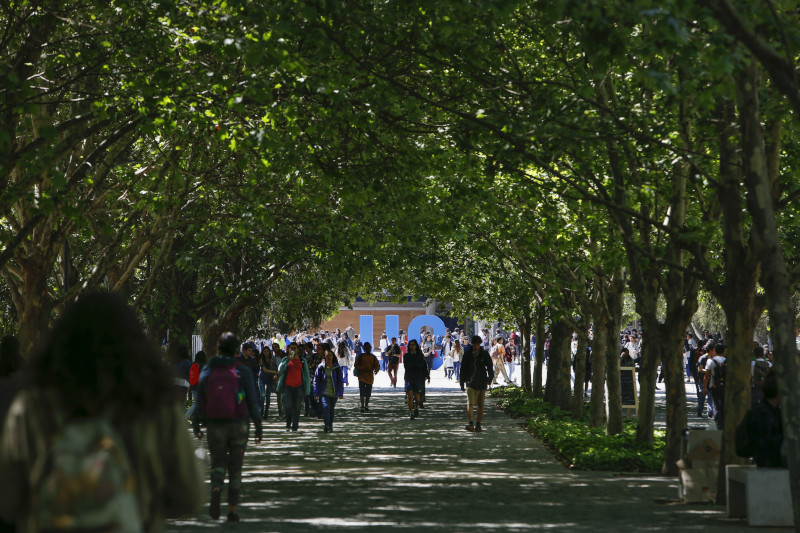Orientations for Working in Chile
Chile's diverse geographical features, including the world's driest desert (the Atacama Desert), snow-capped mountains, and an extensive coastline, create beautiful landscapes that make Chile an attractive destination to settle in.
ON THIS PAGE:
About Chile
GEOGRAPHY It is the longest country in the world, with a length of 4,329 km, equivalent to the 10th part of the circumference of the Earth and, taking into account the Chilean Antarctica, this length reaches 8,000 km. Moreover, it is one of the narrowest countries, with an average width of only 180 km. It is bordered by the Andean Mountain Chain to the East, and the Pacific Ocean to the West, which bathes all of its coasts. Due to its length, it is a nation of climatic and geographical contrasts. WEATHER Despite the extreme weather conditions of the Andean Mountain Chain and the Atacama Desert, Chile has an agreeable temperate climate. Because of its topography and length from North to South, it has a great variety of climates:✔ Dry to the North. ✔ Temperate Mediterranean climate with a long dry season in the center up to Concepción. ✔ Temperate and raining to the South of Concepción up to Punta Arenas. ✔ Polar ice at Antarctica SEASONS As Chile is located in the South hemisphere, the summer begins on December 21 and Winter on June 21. Those who come to live in Santiago will find a stable weather with scant rain and four distinct seasons. In August you can expect a moderate winter, with an oscillation of temperatures with means of 3° and 15°C. People who come in March will enjoy the end of the summer and beginning of autumn, with temperature varying from an average of 9° to 28 °C. TERRITORY Administratively, the country is divided in 16 regions, and its insular territory includes islands, such as the popular Eastern Island. POPULATION According to the National Institute of Statistics (INE), population projected for June 2020 was of 19.458.310 inhabitants. SANTIAGO The capital of Chile is located in the Metropolitan Region. It has more than 7 million inhabitants, as well as interesting and varied historical, tourist, and fun places to visit.

Orientations for Working in Chile - Support Program
UC Chile is committed to advancing internationalization at all levels of our institutional community, including students, faculty, and staff.
Newly appointed professors can reach out to the UC Chile Welcome and Support team, which offers assistance before and after their arrival in Chile. This support includes guidance on immigration and visa applications, an introduction to the Chilean civil registry system, and the UC Chile community.
Sites of interest
Health System
The Chilean health system can be very complex as well as hard to understand at the beginning due to the way it works. All academic, professional and administrative staff from Chile and abroad that work under a short term or undefined agreement with the UC or another institution must enter the Health System, whether public (FONASA1) or private (ISAPRE2), also called Health Insurance. In both cases, you will need an identification number, called RUT in Chile. If there is no selection, the default health system will be FONASA.
Pension System
People coming to live in Chile will have the support of the Chilean pension system, which will allow them to become part of it in equal terms, without losing the contribution to other systems. It is a private individual capitalization system and is formed by institutions called AFP (pension fund administrator), which manage the monthly contribution of all dependent workers, with the aim of financing the pensions for old age, disability, and death. The contribution is charged directly to the employing institution, and depending on the AFP chosen, the amount may vary from 10,69% to 11,44% of your base salary. This variation is due to the different commissions charged by each AFP. Although hiring the AFP that charges the lowest commission is recommended, it is also important to consider the profitability it has had during the last months and even years.
Transportation System
The public transportation system in the city is called Metropolitan Mobility Network, known as RED for its acronym in Spanish. It is an integrated public transportation system that has buses and subway and underground train lines. In order to use the RED, you must get a Bip card, which you can obtain and recharge at different points. It is also possible to recharge it online in the Charge your Bip website, or in the Redbip app, though in this remote modality you must also activate change at one of the Infobit totem in any subway station.
Immigration Procedures
Visa applications for foreigners are received by the Ministry of Foreign Affairs (MINREL), through its online services and its consulates network around the world. The academic, professional, and administrative staff that come to work for the Pontificia Universidad Católica de Chile must process their visa in their country of origin or transit (if authorized) before coming to Chile, for themselves and their families, according to the conditions established by the MINREL in his Information Portal about Consular Services. Interested people from anywhere in the world must apply through the website SAC Ciudadanos (MINREL). This procedure can be done at any time of the year, but completing it promptly, with at least 3 months before your arrival to the country, is recommended.